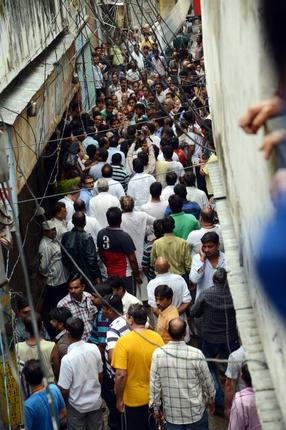Muzaffarnagar, Sep 8: At least 10 more people were killed in spiralling violence in Muzaffarnagar on Sunday, taking the toll to 21 in the western UP district where the army staged flag marches and thousands of anti-riot police personnel were deployed to restore law and order.
“As it (violence) is going on in several villages, it is taking time to defuse the situation,” Additional Director General of Police Arun Kumar, who took stock of the situation in the affected areas, told PTI here.
District Magistrate Kaushal Raj Sharma said that 21 people have died in the violence so far. However, in Lucknow, UP Home Secretary Kamal Saxena said that 19 people have so far been killed in the violence, including 11 on Saturday.
Mr. Saxena said that adequate force has been deployed in the affected areas and incidents of violence have been reported from Sisauli, Shahpur, Fugna, Kalapar and Dhaurakala areas of Muzaffarnagar.
In one place Army had to resort to firing after someone opened fire at them, he said. Asked whether shoot at site orders have been given, Saxena said that directives have been issued to control the situation and for that if necessary firing can be done.
While curfew remained in force in Civil Lines, Kotwali and Nai Mandi town areas of the district with Army carrying out a flag march, violence has now spread to more rural areas.
ADG Kumar, who was escorted by a massive contingent of security personnel, claimed that only four police station areas were affected.
Officials said apart from army, 10,000 Provincial Armed Constabulary personnel, 1300 CRPF men and 1200 Rapid Action Force personnel have been deployed.
In Kutba, where four people were killed, mobs set ablaze a religious place, several shops and vehicles. In Phugana village, cops said three members of a community had taken shelter in a police station, fearing violence.
The other badly affected villages were Shahpur, Bhuvana, Basi Kala.
Army’s assistance has been sought by UP government in nearby Shamli and Meerut district, Amry sources said.
Mulayam meets Akhilesh as army stages flag march
Facing flak from the opposition over Muzaffarnagar communal clashes, Samajwadi Party supremo Mulayam Singh Yadav on Sunday held a meeting with Chief Minister Akhilesh Yadav, ministers and senior officials while the Army staged a flag march in the strife-torn district.
Mr. Yadav held the meeting at his residence on Sunday afternoon in which Chief Secretary Javed Usmani, Principal Secretary Home RM Srivastava and several ministers were also present, sources said.
Expressing displeasure over spurt in violence, Yadav asked them to ensure that law and order is maintained in the state.
“The incident is unfortunate. Our government is committed to strictly dealing with such incidents. Directives have been issued in this regard,” U.P. minister Shahid Manzoor told reporters after the meeting.
However, SP spokesman Rajendra Chowdhury, who too was present at the meeting, did not elaborate details.
“It was not a meeting. We went there for talks...,” Mr. Chowdhury said avoiding questions.
Meanwhile, taking potshots at the ruling party, BJP spokesman Manoj Mishra said, "with Mulayam taking the charge, it has been proved that the present chief minister failed.”
“Due to failure of the present Chief Minister, Mulayam had to take the charge. It has been proved that the government has failed on administrative front,” Mr. Mishra said in a statement.
Meanwhile, following the violence in parts of West UP, Army was pressed into service in Muzzaffarnagar, Shamli and Meerut district, Amry sources said here.
“Eight Army columns from Meerut under Brigadier Jagdeep reached Muzaffarnagar early in the morning and had a meeting with the senior officials of the state police and the civil administration.
“Immediately after the meeting, the Army columns were located in various sensitive areas of the city,” they said.
The Army columns also conducted a mounted flag march in Muzaffarnagar.
Another call for requisitioning Army assistance in Shamli was received from the District Magistrate and accordingly one Army column was moved from Meerut to Shamli.
“Requisition for Army assistance in Meerut was received this afternoon. One more column is being located in Meerut,” they said.
Related: Mulayam holds emergency meet on Muzaffarnagar violence
Toll in UP communal clashes rises to 14






Comments
Add new comment